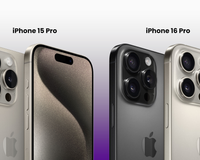Comparison of Apple's artificial intelligence features with those of Google and Samsung in an unbiased way.
The Beginning
Apple's move into artificial intelligence has sparked more scrutiny than ever before. Apple's AI project, known as "Apple Intelligence," has been greeted with a lot of bad press from tech aficionados and the company's fans. But behind all the rumors on the web is a bigger question: Is Apple's AI really behind rivals, or has it become an easy thing to criticise?
This in-depth investigation looks back at Apple's AI, compares it to what Google Pixel and Samsung Galaxy phones have to play with, and tries to separate true issues from criticism that just so happens to be zeitgeisty.

The Big Promise vs. The Real World
Apple's Plans for AI
The company showcased its vision for AI in iPhone, iPad, and Mac environement at WWDC 2024. The company offered features that would revolutionize things such as
-
Automatically writing emails and summarising articles
-
AI-powered emoji creation (called "Genmoji")
-
A fully redesigned Siri that can have conversations and understand what's going on around it
-
Adding personal information to apps and gadgets
- Apple called this the "beginning of a new era" because Siri would be getting "aware of your personal context, the ability to take action in and across apps, and product knowledge" of user devices.
The Truth Check
The release, however, has been very different from these colossal boasts. Due to technical problems, significant updates that were supposed to be rolled out for the iPhone 16 series of phones later in 2024 have now been put on hold indefinitely. The next evolution of Siri "does not work properly," reads news coming from Bloomberg. Apple actually sold consumers "little more than a barely working prototype."
In internal meetings, Apple's Siri team leaders called the delay a "ugly" situation, recognising that both employees were upset and Siri's image was getting worse. The difference between what the company said in marketing materials and what it could actually do hurt its reputation in a big way.
Current Evaluation of Features
Apple has managed to implement some AI features with success, but they paint a mixed picture.
Features That Were Added
-
AI-based news alert digests (which were later pulled down in stealth because they weren't accurate)
-
Photo Clean Up option to scrub objects out of photos
-
Image Playground within iMessage basic processing improvements on the device.
How users felt: Most people didn't like these features. The news summariser was known to produce utterly inaccurate summaries, and therefore most people even switched it off completely. Though there is photo editing software, it's commonly known as "novelties" instead of "revolutionary capabilities."
One industry study stated that Apple Intelligence appears "ill-defined and a bit vague." It's essentially a collection of various features, and Apple is obviously "playing catch-up" to competitors.

Siri: From a First to a Joke
The Historical Setting
Siri's tale is one of the most sensational U-turns in technology history. Siri first arrived on the scene with the iPhone 4S in 2011 and educated millions about how to speak to their phones. It was a really big deal for its time.
In 2025, Siri is what most people view as Apple's largest continuous failure. The assistant that once was the best now trails behind Google assistant and even Samsung's Bixby in many useful respects.
There are several significant issues with practice knowledge and query processing.
The use of Siri today suggests that it has fundamental problems with bringing in primary information. Siri always answers questions answered outright by rivals with the reply "Here's what I found on the web."
Simple question about facts oftentimes provide lists of web links instead of verbal responses, which eliminates the whole purpose of voice contact.
Operating devices and carrying out actions
Relative comparisons with 25 common voice requests showed that Siri could only accomplish 13 tasks consistently, and in at least 7 cases, it returned incorrect or useless results. Some instances of mistakes include:
-
Screen Recording: Siri showed help pages instead of starting the recording, but Samsung's Bixby started screen recording right away.
-
Scan QR Codes: Instead of opening the camera, Siri scanned online for QR codes.
-
Hotspot Activation: Siri needed to hear exact Apple language ("Personal Hotspot") instead of usual words like "Wi-Fi hotspot."
-
Media Control: When consumers wanted to watch certain Netflix content, they were greeted with suggestions for unrelated Apple TV+ material.
Things that are technical and strategic
Freedom vs. Privacy Trade-offs
Apple's emphasis on privacy and local processing has generally limited Siri's capability to learn. Google's assistant learns from a massive amount of search data and user behaviour. Apple's more cautious approach has slowed Siri's growth.
This difference in philosophy has real-world effects. Google's capacity to learn from a tremendous amount of user data enables it to more effectively understand context and spit out better answers. Apple values user privacy, so assistant brains are sacrificed to preserve user information.
Issues with Architecture
Former Apple employees explained that Siri's early version was constructed on superficial, keyword-based rules instead of modern neural networks. Such a foundation made it very hard and cumbersome to add new features to Siri and hindered its technology growth.
According to new speculations, Apple has been working on "Siri 2.0" using big language models. However, until the mid-year of 2025, users could not perceive any tangible improvement from all these endeavors.
![]()
A summary of the competition
Setting the benchmark for AI with Google Pixel
How a whole AI integration appears in real life is evident in Google's Pixel series. The company stands tall as it excels in search and is poised to push the boundaries of AI.
Details that stand out
-
Call Screen: This is one of the Pixel features most wanted by users. It uses Google Assistant to block calls from unknown numbers, talk to callers, and provide real-time recordings. This functional use of AI solves a real problem that users face, something Apple does not have an answer to.
-
Better Knowledge Base: As Google Assistant runs on Google's search infrastructure, it is able to give direct answers to queries that Siri would otherwise ask users to visit web links and read.
-
Better Photography AI: Magic Eraser, Photo Unblur, and Magic Editor coming down the line are just a couple of the advanced AI tools that are better than Apple's Photo Clean Up tool.
-
Gemini Integration: Google's new generative AI features are quickly being incorporated into Pixel phones. These features will make on-device AI chat and image creation better than Apple currently has.
Samsung Is an Unexpected Competitor
Samsung's AI story combines Google services with in-house innovations, yielding unexpectedly robust ecosystem.
Bixby's Changes
Bixby was ridiculed at one point, but it has developed into a talented device control expert behind the scenes. In a head-to-head comparison test, Bixby trounces Siri again and again in real-world tasks:
Understanding different ways to say commands
Performing actions at the system level (like changing notifications and changing settings) and accessing gadget features without needing to learn specific words
In recent tests where the three were compared, Bixby was able to complete more tasks accurately than Siri and Google Assistant when it was controlling a device.
Building ecosystems
Samsung has features such as:
-
Live Translate to translate conversations in real time when you are on call.
-
Bixby Text Call to handle spam calls
-
AI Scene Optimiser for taking pictures
-
It has cross-app features not in Siri
-
Apple’s More Comprehensive AI Use
Intelligence Across the Ecosystem
Apple's implementation of AI extends beyond Siri across its platform:
-
Text and Input: Transformer models have been used to make autocorrect and predictive text smarter.
-
Photos: Visual Look Up, face recognition, and AI-based organization
-
System Intelligence: Spotlight Search and Siri Suggestions by what things are for Voice Processing: on-device dictation that is more accurate
-
Putting privacy first has benefits
-
Apple's cautious strategy does have some benefits
-
No third-party sharing of personal information
-
Device processing of personal information
-
User confidentiality-respecting integration with ChatGPT
-
Reduced chance of AI hallucinations or fake responses
-
Users favor this trade-off in a sample, choosing privacy over state-of-the-art capability.
Evaluation: Justified Criticism or Bandwagon Reaction?
Objective Performance Shortfalls
The evidence suggests Apple's AI criticism is generally justified:
-
Functional Limitations: Siri has objectively poor performance on tasks the competition does routinely
-
Feature Delays: Overhyped features are pushed back by technical issues
-
User Experience: Most of the current AI features are gimmicky or half-finished
-
Competitive Position: Apple convincingly trails in AI-driven smartphone features
Contextual Considerations
However, the degree to which these shortcomings are important depends on individual user needs:
For Basic Users: Those who rely most on voice commands for timers, music, and smart home control may be content with Siri.
Privacy-Conscious Users: Apple's approach has tangible advantages for users who prioritize security over functionality.
Ecosystem Integration: Apple's tight hardware-software integration produces benefits that do not require the newest AI.

Future Outlook
Apple's Historical Pattern
Apple has tended to jump into technology categories late but ultimately dominate with improved design and integration. Examples:
-
MP3 players (iPod)
-
Smartphones (iPhone)
-
Smartwatches (Apple Watch)
This pattern suggests potential for revolutionary AI breakthroughs, but only if Apple manages to overcome its present technical challenges.
Current Development Initiatives
-
Apple is investing heavily in AI infrastructure, according to sources:
-
Large language model construction
-
Redesign of Siri architecture
-
OpenAI collaboration on new features
-
Additional AI recruitment
The question remains whether these bets will yield user-confrontational payoffs in time to remain competitive.
Conclusion
Apple's AI offerings have undoubtedly earned much of their criticism through objective flaws instead of mere internet pile-on syndromes. Siri's decline from pioneer to punchline aligns with real technical and strategic errors that have allowed competition to get well ahead.
The current state of Apple features — delayed, watered down, or dropped completely — is an indicator of execution issues that are unprecedented for Apple. When users cannot ask Siri basic questions or utilize it for basic tasks that function perfectly on competitor devices, denunciation follows.
But Apple's situation isn't set in stone. The resources, brains, and heritage of the company suggest great improvement potential. The question is timing: Can Apple close the gap in AI in time to prevent losing permanent market share in a more and more AI-driven smartphone universe?
For now, consumers and pundits can only judge what they are working with. On that basis, Apple's AI does indeed fall behind the rest in meaningful ways, and the skepticism and criticism are more justified than merely trendy.
It is Apple's responsibility to prove that its deliberate, privacy-focused approach with AI can yield strong user experiences competitive with or better than Google and Samsung's offerings in the market today. Short of that, the "AI laggard" label will persist, earned on solid disappointments rather than unwarranted demonization.
This review relies on user input, professional testing, and features compared as of June 2025. Apple AI continues to advance, and future innovation may revolutionize the competitive landscape.

![The Best iPhones for battery life ranked [2025]](http://reboxed.co/cdn/shop/articles/IPHONE-BATTERY_e2de6230-b1d2-4348-ac33-e47d1e267bdd_100x80_crop_center@2x.jpg?v=1738489925)






